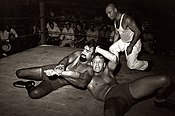
Back حروب ليلة الإثنين Arabic Monday Night Wars Danish Monday Night Wars Spanish Monday Night Wars French Monday Night War Italian マンデー・ナイト・ウォーズ Japanese 먼데이 나이트 워스 Korean Monday Night Wars Dutch Monday Night Wars Portuguese Monday Night Wars Russian
This article needs additional citations for verification. (October 2022) |
| Part of a series on |
| Professional wrestling |
|---|
 |
The Monday Night War[1][2][3][4] or the Monday Night Wars, was an era of mainstream televised American professional wrestling, from September 4, 1995 to March 26, 2001, in which the World Wrestling Federation's (WWF; now WWE) Monday Night Raw (later Raw Is War) and World Championship Wrestling's (WCW) Monday Nitro were broadcast opposite each other in a battle for Nielsen ratings each week. It largely overlapped with the Attitude Era, a period in which the WWF used the term "WWF Attitude" to describe its programming from November 9, 1997 to May 6, 2002.
The rating war was part of a larger overall struggle between the WWF and WCW, originating in personal animosity between respective owners Vince McMahon and Ted Turner. The rivalry steadily escalated throughout the 1990s to include the use of cutthroat tactics and the defections of employees between the two promotions. Throughout the war, the WWF and WCW would both adopt different concepts and narrative techniques. Meanwhile, both companies would establish both formal and informal partnerships with Extreme Championship Wrestling (ECW), with ECW performers either appearing on WWF and WCW shows while still under contract, or outright leaving ECW to work for one of the other two companies.
While WCW was the dominant promotion for much of the mid-1990s, a variety of factors coalesced to turn the tide in the WWF's favor at the end of the decade, including a radical rebranding of their formerly family-friendly product into highly sexualized and violent shows geared towards older teens and adults. WCW ultimately ran into financial difficulties as a result of the amount of money they had promised wrestlers during a hiring binge in the early and middle part of the decade, which had been aimed at acquiring large portions of the WWF's talent roster. Behind the scenes, executives who had longed to see WCW removed from the Turner organization were eventually able to see it come to fruition after Turner Broadcasting's merger with Time Warner and their merger with America Online (AOL). With Turner no longer in control, corporate executives of the combined AOL Time Warner sold WCW's assets. Despite efforts to salvage the company, it was ultimately sold to McMahon, ending the Monday Night War.
In retrospect, wrestling commentators have come to see the Monday Night War as a golden age of professional wrestling, along with the 1940s–1950s and 1980s booms, with the competition between the WWF and WCW bringing out their best quality product both in terms of creativity and the performances of their wrestlers.
- ^ "VIP 1996 BACK ISSUE – Pro Wrestling Torch #392 (June 15): WWF strikes back at WCW with Pillman signing, Nash debuts on Nitro and will Hogan lose, Bret Hart speaks out, Mitchell on WWE-WCW-ECW jumps". PWTorch. June 15, 1996. Retrieved March 14, 2024.
- ^ Schwartz, Nick (August 26, 2014). "Hulk Hogan 'prayed to God' the WWE wouldn't lose the Monday Night War". For The Win - USA Today. Retrieved March 14, 2024.
- ^ Meltzer, Dave (November 23, 2015). "October 12, 1998 Wrestling Observer Newsletter: Monday Night War ratings effect on Monday Night Football, UFC woes, plus more". WON/F4W. Retrieved March 14, 2024.
- ^ Meltzer, Dave (November 30, 2022). Richardson, Benjamin; Richardson, Dante (eds.). The Wrestling Observer Yearbook '95: The Monday Night War Begins. Amazon Digital Services LLC. ISBN 9798361798148.
© MMXXIII Rich X Search. We shall prevail. All rights reserved. Rich X Search

